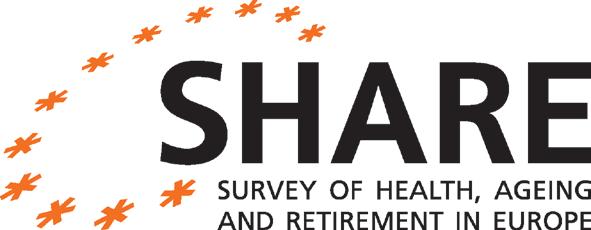SHARE
SHARE – Survey of Health, Ageing and Retirement in Europe

Objectives
SHARE, the Survey of Health, Ageing and Retirement in Europe, is a research infrastructure for studying the effects of health, social, economic, and environmental policies over the life-course of European citizens and beyond.


Funding
SHARE-ERIC is currently receiving funding from the European Union under grant agreements No 101102412 and the European Union’s Horizon 2020 research and innovation programme under grant agreements No 870628, No 101015924.


SHARE; a window into the ageing process
More and more of us are living for longer, raising important questions about how people can maintain a good quality of life into their old age. The SHARE infrastructure brings together health and socio-economic data on people over the age of 50 across 27 European countries and Israel, providing valuable insights into the ageing process, as Professor David Richter explains.
The European population is ageing rapidly, raising important questions about how to fund pensions, healthcare, and long-term care systems and help individuals maintain a good quality of life into their old age. The Survey of Health, Ageing and Retirement in Europe (SHARE) is a research infrastructure that provides rich data for valuable insights into the health and socioeconomic circumstances of people over 50 across Europe. The international coordination is based at the SHARE Berlin Institute, located in Berlin, Germany. “In SHARE, interviewers in 28 countries go to randomly selected households drawn from public databases, mostly from official person registers covering the population of interest. The SHARE data are based on full probability samples, providing internationally comparable and representative data,” outlines Professor David Richter, Director of the SHARE Infrastructure. The interviewers ask a standardised set of questions and gather data on individual health. “We have devices to measure grip strength or accelerometry and we do some wave-specific medical tests, such as asking people to get up off a chair then sit down again without using their arms for five times,” says Professor Richter. “We also have a battery of cognitive performance and functional performance measures, for instance a word recall question.”
SHARE consortium
The SHARE data provide a comprehensive picture of people’s physical, mental, and cognitive health, alongside information about their social and economic circumstances, which can also be used to guide and inform policy. Since its inception in 2004, interviews have been conducted with respondents every two years in nine regular waves of data collection. In 2020-21, two additional waves
about their income and expenditures. We have information on the number of generations living in a household, and there are considerable differences across Europe in this respect,” says Professor Richter.
The European population has changed significantly over recent years, with many countries seeing a large influx of refugees, such that it is also important to bring new people into the survey to reflect these wider
In SHARE, interviewers in 28 countries go to randomly selected households drawn from official person registers covering the population of interest. The SHARE data are unanimously based on full probability samples, providing internationally comparable and representative data.
focused on the consequences of the Covid pandemic. Close to 20 years in running, SHARE data allow researchers to study the changes in respondents’ life circumstances over time. “We try to interview the same respondents every wave and we want people to stay in the SHARE panel survey for as long as possible,” stresses Professor Richter. SHARE also includes data on people living in nursing homes. “We want to learn about the living situation of people in nursing homes. There are also questions about how many people live in a household,
demographic shifts. Alongside refreshing the sample, Professor Richter highlights that new questions may need to be added from time to time. The aim is to strike the right balance between maintaining stability in the questions, so as to provide a picture of development over time, while at the same time bringing in new questions to reflect emerging concerns such as climate change, which can have a significant impact on older people. “Many European countries have experienced increasingly intense heatwaves over the last few years, which are a
health risk to older people. It might be that we want to ask about their living situation, do they have air conditioning for example? We would need to think of new questions to cover such emerging challenges,” says Professor Richter. The SHARE data help researchers to portray a fuller picture of the ageing process and uncover new insights into how people can maintain their independence for longer, reducing the pressure on countries’ healthand long-term care systems. SHARE data are available to researchers free of charge, and they have been used in almost 4,000 publications. Instructions for registering as a data user can be found on the SHARE website: https://shareeric.eu/data/become-a-user. “Researchers can study anything covered by the SHARE dataset and publish papers with it. Some researchers have looked at the connection between physical activity and cognitive function, while others have looked at the impact of the Covid pandemic on loneliness,” outlines Professor Richter. The second pillar of uses of SHARE data is to inform policy development. “Policy makers can use the data to inform their decisions. Policy making is about more than just data and numbers of course, but information is needed, for issues such as retirement savings, health and healthcare needs and older adults’ social networks to name but a few” continues Professor Richter.
Future of SHARE
The SHARE data has been used specifically for such questions, for example with researchers providing advice to the German and French governments on pension reform, which can be a highly contentious, divisive issue. While ultimately these are political choices, Professor Richter believes that evidence from the SHARE infrastructure can play an important role in informing and guiding the decisions of
policy makers. “With more people living for longer, and the working population shrinking in relative terms, decisions have to be made,” he says. The survey was initially funded for a 20-year term, due to end in 2024, but it will now be extended further, putting SHARE on a more secure long-term footing. In March 2011, SHARE became the first European Research Infrastructure Consortium (ERIC). This gave the SHARE data collection project a legal personality and capacity in all EU member states and participating associated countries. Moreover, SHARE-ERIC, headed by SHARE’s founder Professor Börsch-Supan and one of the few “European Landmark Research Infrastructures”, serves as the main funding channel for SHARE. “Since 1 January 2023, we have also established the new SHARE Berlin Institute, with additional funding from the German Ministry for Education and Research for the international coordination of the survey” continues Professor Richter. While some aspects of SHARE are highly centralised, data are collected by highly committed, locally based teams across the 28 countries. “There are lots of very competent and interesting people from different countries working in SHARE,” says Professor Richter. Their work has established SHARE as an invaluable resource for researchers, yet at the same time Professor Richter says there is a need to bring in fresh ideas to demonstrate the continued relevance of the infrastructure. While continuing to provide a stable and reliable panel database covering long-term socio-economic and health issues, there is a need to modernize the SHARE infrastructure to benefit from technological innovations in survey methodology. By meeting this challenge, we expect the SHARE infrastructure to maintain its position as one of the most valuable data sources for Europe’s policy makers and the scientific community.
Additional funding from the German Federal Ministry of Education and Research, the U.S. National Institute on Aging and from various national funding sources is gratefully acknowledged (see https://www.share-eric.eu/).
Contact Details
Prof. Dr. David Richter

Director SHARE Infrastructure SHARE BERLIN Institute GmbH, Chausseestrasse 111, 10115 Berlin
T: +49-30 994 042 721
E: drichter@share-berlin.eu
E: info@share-project.org
W: https://www.share-eric.eu/ : https://twitter.com/SHARE_MEA
Börsch-Supan, A., M. Brandt, C. Hunkler, T. Kneip, J. Korbmacher, F. Malter, B. Schaan, S. Stuck, S. Zuber (2013). „Data Resource Profile: The Survey of Health, Ageing and Retirement in Europe (SHARE)”. International Journal of Epidemiology. DOI: 10.1093/ije/dyt088
David Richter is the Director SHARE Infrastructure at the SHARE Berlin Institute and a Professor of Survey Research at the Free University Berlin. As psychologist, he is interested in the development of emotions, well-being, and life satisfaction across the adult lifespan and the influence of life events on the development of well-being.
